Author Archives: Amy Stone
December 25, 2014 by Amy Stone
May Her Brisket Be for a Blessing
 Grieve. Cook. Bond.
Grieve. Cook. Bond.
By the time my buddy Susan’s father died, the parental East Side Manhattan apartment was getting to look like an assisted living center, housing Susan’s elderly father, mother and aunt, assisted by the team of helpers.
This was the long goodbye to a once powerful man.
Not exactly your traditional Jewess, Susan knew she had moved beyond immediate grief when she turned to Jerusalem A Cookbook. The gorgeously complex recipes of Yotam Ottolenghi and Sami Tamimi are our psalms. Preparation is all consuming and the results must be rejoiced over with friends.
A single Ottolenghi recipe is a major commitment. Three dishes are a triathalon. The recipes: baby spinach salad with dates and almonds, mejadra (lentils with spices) and roasted chicken with lemon and Jerusalem artichoke (forego that last ingredient, unfindable even on the Upper West Side). Susan gathered together buddies who go back to sleep-away camp and Fieldston then Volunteers of America and more recent buddies of the current century. We ate. We drank. We summarized our life stories. And Girls’ Night In was born.
- No Comments
December 5, 2014 by Amy Stone
‘She’s Beautiful When She’s Angry’ – The women’s movement gets a kick-ass documentary
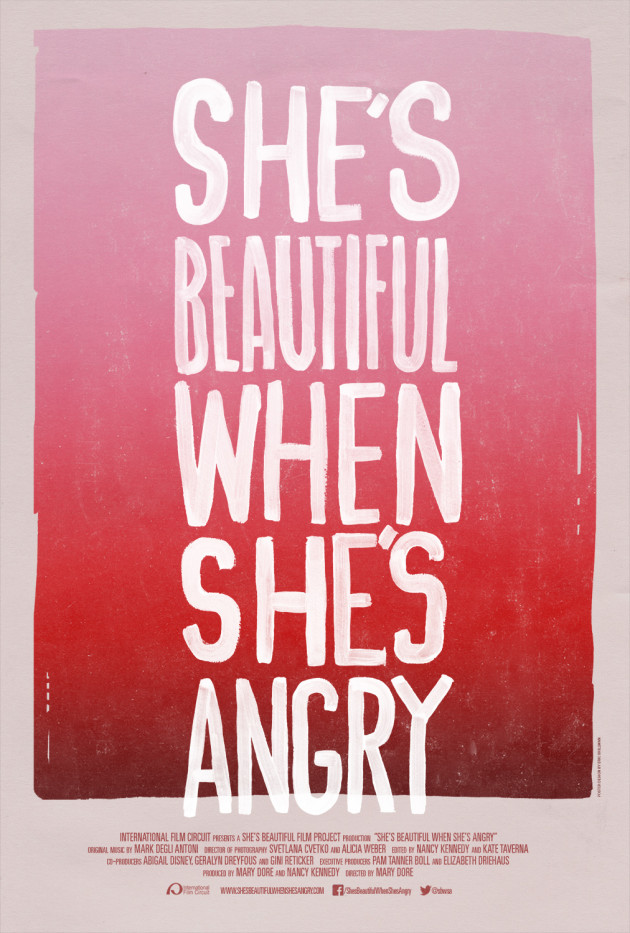 “She’s Beautiful When She’s Angry” is the women’s movement film we’ve been waiting for. We just didn’t know it.
“She’s Beautiful When She’s Angry” is the women’s movement film we’ve been waiting for. We just didn’t know it.
With outrage and humor, the 90-minute documentary brings back the revolution in living color and black-and-white, with torrents of music from the ‘60s and ‘70s. If you were there, it’s the turn-on of reliving the Great Awakening. If you weren’t yet born, hopefully you’ll get what an exciting, life-changing time it was. And–guess what?–it’s not over.
Producer/director Mary Dore, 63, started the project more than 20 years ago, before her twin sons, now 21, were born. With producer Nancy Kennedy and many, many women and some men, and support, which included Kickstarter funding, the film is finally OUT!
- 1 Comment
October 21, 2014 by Amy Stone
Diving Into Charges of Rabbi Barry Freundel’s Voyeurism

A leading Modern Orthodox rabbi is taken away in handcuffs by police Oct. 14 on criminal charges of voyeurism, more precisely for installing and maintaining an electronic device to secretly record “female complainants using a bathroom or restroom or totally or partially undressed or changing clothes.” In court the next day, the rabbi denies these charges of deviant acts of seeking out women with a hidden video camera in the mikvah of his own congregation– Kesher Israel in Washington, D.C.
O Rabbi Barry Freundel! If indeed you did this deed, how could you?
This is the stuff of an Isaac Bashevis Singer story conjuring up the demonic side of shtetl life. Not the schoolboy prank where Yentl the Yeshiva Boy is approached by her bad-boy classmates to join them in spying on naked women in the bathhouse. No. This is something deeper, darker, if indeed true. It is the kind of unnatural tale that in I.B. Singer’s hands could terminate in damnation. In our modern demonic world, the damage seems to be spreading beyond the soul of the alleged perpetrator.
The higher the status, the more tragic the fall.
- No Comments
Feminists In Focus, The Lilith Blog
February 12, 2014 by Amy Stone
Meet on Screen the First Woman Rabbi
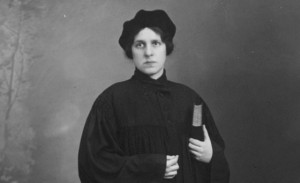
via filmlinc.com
How do you make a documentary about Regina Jonas, the world’s first woman rabbi, when only one photograph survives?
It helps if you’re pushed to do the deed by Elsa Klapheck, the contemporary German rabbi whose book, Fraulein Rabbiner Jonas: The Story of the First Woman Rabbi, is the definitive source on this extraordinary woman, born in Berlin in 1902 and ordained in 1935. (The book has been translated into English by Lilith contributor Toby Axelrod. Klapheck, ordained in Frankfurt, is the first woman rabbi in the Netherlands.)
“Regina” — Diana Groó calls her film “a poetic documentary” of Regina Jonas — made its U.S. premiere in January at the 23rd NY Jewish Film Festival, presented by the Film Society of Lincoln Center and The Jewish Museum. The 63-minute film is in English.
Groó, 40, who seems either doomed or destined to be identified as a Jewish Hungarian filmmaker, stayed true to the hundreds of documents Regina Jonas managed to save for posterity. The poetry comes with the archival footage – going back to 1900s Berlin — combined with music and voices. British actress Rachel Weisz is the voice of Regina Jonas. Others giving life to archival material include Groó’s grandmother, 86, the same age as Jonas’s students would have been, and a survivor of four concentration camps.
- No Comments
November 15, 2013 by Amy Stone
Losing My Virginity: Of Romance and Property Rights

The filmmaker in a virginal white wedding gown.
If only Therese Shechter’s film “How to Lose Your Virginity” had been around when I was a college student obsessing about “saving it.” Freed from endless years of mental anguish, I probably would have had enough time to graduate Phi Beta Kappa and, who knows, maybe even have some good sex.
Or not. …
The film gets its US premiere this Sunday, Nov. 17, at 9:30 p.m. at the DOC NYC film festival at the SVA Theater, 333 West 23rd Street. The screening will be followed by a Q&A with director Therese Shechter and producer Lisa Esselstein.
Sixty-plus minutes of virginity, virginity, virginity makes you feel like you’ve been exorcised from ever again wanting to think about the V-word. Shechter, a nice Jewish art student from the Toronto suburbs, now a filmmaker in Brooklyn, has truly delivered a film that entertains, horrifies and instructs.
Get ready for details of America’s chastity balls (next step chastity belts?), where girls hand over their virginity to their fathers for safekeeping until dads deliver the precious commodity to the future husbands. Get ready for the TV vampire whose hymen keeps growing back again and again, forcing her to go through first-time intercourse pain for eternity. And get ready for some healthy advice from former Surgeon General Joycelyn Elders. One memorable piece of government information: 50 million in tax payers’ dollars goes to fund abstinence programs in the schools that are both unscientific and ineffective. (Is it too much to hope that this will get axed in government cutbacks?) And get ready for a wildly inclusive array of women, including the filmmaker, weighing in on virginity.
- 1 Comment
June 21, 2013 by Amy Stone
Orthodox Women Rabbis
by Any Other Name
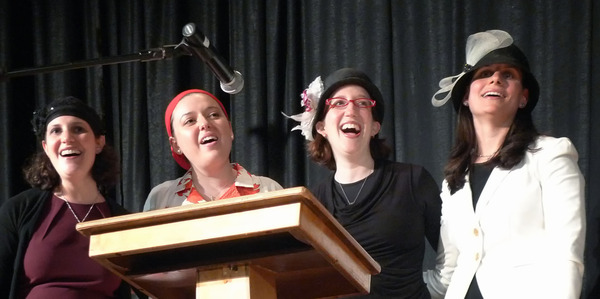
From left to right, at the June 16 Yeshivat Maharat ordination ceremony in New York: Rabba Sara Hurwitz (dean of Yeshivat Maharat), Maharat Ruth Balinsky Friedman, Maharat Rachel Kohl Finegold, and Maharat Abby Brown Scheier. Photo by Joan Roth with permission of Yeshivat Maharat.
It happened! On June 16 three Orthodox women were ordained as clergy by an Orthodox religious institution.
I am not a superstitious person but I mentally spat three times to ward off the evil eye and forestall enraged Orthodox males – and females – from attacking the three women ordained with the title of “maharat” in Manhattan on the gloriously sunny June 16 Sunday afternoon. Of course such misogynist religious violence – think the physical attacks on Women of the Wall in Jerusalem –could never happen here. Really? It could but hopefully won’t.
For sure these three women will be Orthodox role models. And for sure they’ve picked up inspiration along the road to maharat from Blu Greenberg, woman of grace and wise determination. Founder of JOFA (Jewish Orthodox Feminist Alliance) in 1997, for years she’s been predicting we would see Orthodox women rabbis in our lifetime. Activist Rabbi Avi Weiss turned Greenberg’s words “Where there’s a rabbinic will, there’s a halakhic way” into a new kosher reality.
They certainly have pastoral powers but defining maharat remains a work in progress. They cannot count in a minyan or act as witnesses in a Jewish court or in signing Jewish documents. According to the head of Yehisvat Maharat, Rabbi Jeffrey Fox, “They are only permitted to lead services or read Torah within the framework of Halakha.” Will a rabbinic court (men only) determine the framework?
- No Comments
May 9, 2013 by Amy Stone
The Wall and I
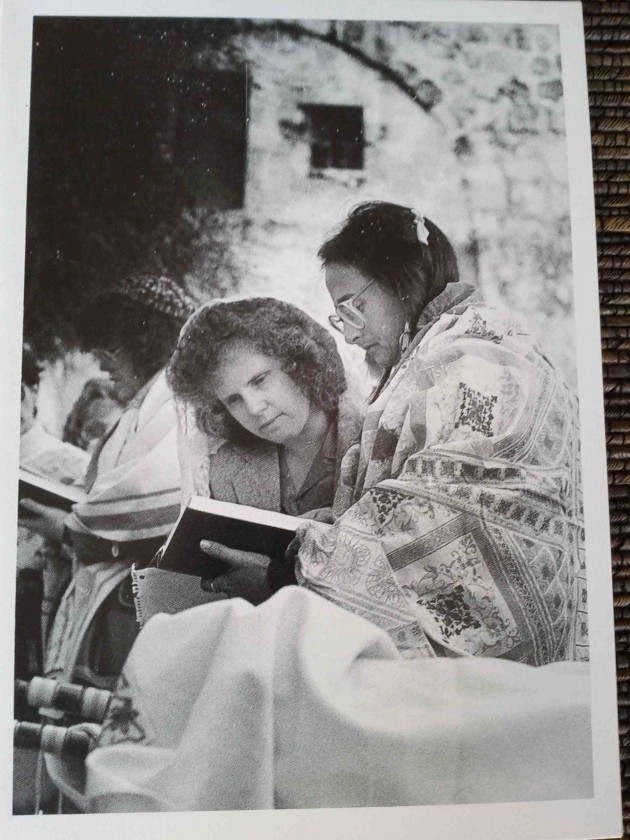
Historic c Barbara Gingold, Jerusalem.
The Wailing Wall is dead – hopefully.
Not just because the term “Wailing Wall” has long been replaced by “Western Wall” or “Kotel” for the remains of the temple mount in Jerusalem but because of the victory – hopefully not short-lived – of Israeli state justice over Black Hats with political pull.
Separate and hopefully finally equal. In the women’s section of the wall, women can now put on all the ritual accoutrements of prayer traditionally worn by men and can conduct services, read from the Torah without getting hauled off by police for offending some Orthodox males in the men’s section of the wall.
Thank God. Or, more precisely, thank the sanity of the Israeli court system, not to be confused in any way with the beit din, the religious court where women are forbidden to give testimony, let alone judge.
The Wall and I Part One
My own relationship to the Wall goes back to the ‘60s. Heading home to New York after three years in Thailand (Peace Corps teacher then Bangkok Post reporter), I stopped in Israel. I landed in Lod (now Ben-Gurion Airport) on Shabbat – like landing in the bottom of an elevator shaft. Almost no way out.
- 3 Comments
March 29, 2013 by Amy Stone
Stuttgart seder – where no Jewish feminist has gone before?

Prologue: Back in New York, the Stuttgart synagogue demands proof of our Judaism before admitting us to the seder given by the Jewish Religious Community of Württenberg (the part of Southwest Germany where Stuttgart is located).
They’re expecting an overflow and Jews get priority. Having to prove you’re Jewish in Germany? As one no-nonsense D.C. rabbi put it, “I’ve had to vouch for the Judaism of people making aliyah, but Germany?” I email a photo of our ketubah. All these years I’d been feeling guilty that I’d sold out and had two male witnesses rather than one female and one male sign our marriage contract. Now bowing to the Orthodox authorities has paid off.
Main event: Problems evaporate. All four of us are admitted to the Stuttgart Jewish community seder – my beloved and I, our raised-Catholic hostess, Christie, and 17-year-old son, Oskar. No security guards. No passport check. About 100 of the faithful are seated at long tables with the Orthodox rabbi at head table, rebbetzin at side. He’s in a kittel (white cloth robe), long white beard, black yarmulke over receding hairline. Christie, a former television newscaster, goes to shake his hand. He recoils. Welcome to someone else’s Judaism.
We get lucky. We end up with a bunch of what looks like Israeli hippies. Turns out they’re The Voca People. Oskar is impressed. We’re clueless. In performance, they’re a singing group of eight, dressed like something between all-white Smurfs and George Segal plaster-of-Paris sculptures with red lipstick. More than 12 million people have already clicked on their website. They’re all about how music needs no translation.
Back at the seder, forget Miriam’s Cup. I have no idea whether or not Miriam plays a role in the Israeli Jewish National Fund (JNF) edition of the parting of the Red Sea.
- 2 Comments
February 14, 2013 by Amy Stone
Where the Women Are (At the 22nd Annual NY Jewish Film Festival)
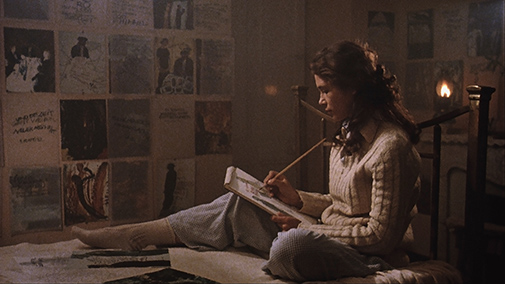
Life? Or Theatre?
Dutch director – male – obsessed with tragic German artist – female. German auteur filmmaker – female – honing in on interplay of intellect and sexuality driving renowned German-American political theorist – also female. Polish filmmakers – male – documenting a Polish town’s response to death camp transports but failing to get the only known survivor dropped from a train, a woman, to talk.
What do this year’s NY Jewish Film Festival offerings say about the roles of Jewish women when women and men make film? From a wide-ranging two weeks of domestic and international films, here come snapshots of three Shoah-related films: one documentary, one feature, one documentary short.
Long-time Dutch filmmaker Frans Weisz is a man obsessed with artist Charlotte Salomon, the subject of his 1981 feature film “Charlotte” and his freewheeling documentary, 30 years later, “Life? Or Theatre?”
Poor Charlotte. The shy, almost invisible, middle-class German Jew. She had one passionate relationship in Nazi Berlin before fleeing to the relative safety of a wealthy American woman’s chateau in the south of France. As Hitler destroyed European Jewry, Charlotte worked out her own life story in Leben? oder Theater? Diving into this massive work was her response to learning of her family’s hidden history of suicide, including her own mother. (Now in Amsterdam’s Jewish Historical Museum, the nearly 800 gouaches are like the storyboard for a musical, a three-part life story with acts and scenes, with tracing-paper overlays of comments and musical notations. The artist pared them down from an outpouring of some 1,300 pieces.)
- 1 Comment
February 6, 2013 by Amy Stone
Let Us Now Praise Non-Jewish Jews
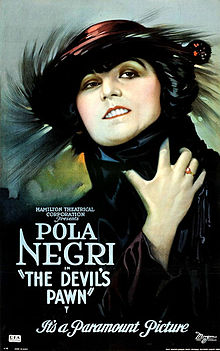
Dispatches from the NY Jewish Film Festival.
(The 22nd New York Jewish Film Festival, presented by The Jewish Museum and the Film Society of Lincoln Center, ran through Jan. 24, 2013. The Ninth Annual Brooklyn Israel Film Festival, ran Jan. 24, 26, 27. For details, visit here.)
[WARNING: If by some long shot you’re planning to see “The Yellow Ticket” do not let this review ruin the plot. Skip to “AKA Doc Pomus.”]
The jaw-dropping happy ending to the 1918 Pola Negri silent film “The Yellow Ticket” (also translated as “The Devil’s Pawn”) is that the super smart and beautiful young Jewess from Warsaw is not Jewish. She’s the love child of the distinguished medical professor whom she’s studying with in St. Petersburg. She then gets to accept the affection of her dashing Russian classmate.
But this OMG-she’s-not-Jewish ending shouldn’t make the film traif. The plot is based on a Yiddish melodrama and is believed to be the earliest film dealing with discrimination against Jews in Czarist Russia.
“The Yellow Ticket” was screened at the NY Film Festival Jan. 10, with a new score by klezmer violinist extraordinaire Alicia Svigals, with Svigals on violin and singing, and Marilyn Lerner on piano.
Amidst the pantomimed over-acting that is the hallmark of many a silent film, Negri plays the brilliant young woman with delicacy, despite the heavy-duty black eye makeup found only on a silent film star or a raccoon.
- No Comments
 Please wait...
Please wait...